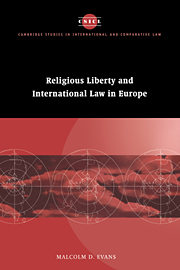Book contents
- Frontmatter
- Contents
- Acknowledgments
- Chronological table of international treaties
- Table of cases
- List of abbreviations
- Introduction
- 1 Early antecedents
- 2 From Augsburg to Paris
- 3 The League of Nations: drafting the Covenant
- 4 The Polish Minorities Treaty
- 5 The extension of the minorities system
- 6 The experience under the League
- 7 The UN system
- 8 Article 18 of the International Covenant on Civil and Political Rights
- 9 The 1981 Declaration on the Elimination of All Forms of Intolerance and of Discrimination Based on Religion or Belief
- 10 Religious freedom under the European Convention on Human Rights: the drafting of Article 9 and of Article 2 of the First Protocol
- 11 The application of Article 9 of the European Convention on Human Rights
- 12 Restrictions upon the scope of Article 9(1)
- 13 The application of Article 2 of the First Protocol
- 14 An interim conclusion
- Bibliography
- Index
- CAMBRIDGE STUDIES IN INTERNATIONAL AND COMPARATIVE LAW
13 - The application of Article 2 of the First Protocol
Published online by Cambridge University Press: 06 January 2010
- Frontmatter
- Contents
- Acknowledgments
- Chronological table of international treaties
- Table of cases
- List of abbreviations
- Introduction
- 1 Early antecedents
- 2 From Augsburg to Paris
- 3 The League of Nations: drafting the Covenant
- 4 The Polish Minorities Treaty
- 5 The extension of the minorities system
- 6 The experience under the League
- 7 The UN system
- 8 Article 18 of the International Covenant on Civil and Political Rights
- 9 The 1981 Declaration on the Elimination of All Forms of Intolerance and of Discrimination Based on Religion or Belief
- 10 Religious freedom under the European Convention on Human Rights: the drafting of Article 9 and of Article 2 of the First Protocol
- 11 The application of Article 9 of the European Convention on Human Rights
- 12 Restrictions upon the scope of Article 9(1)
- 13 The application of Article 2 of the First Protocol
- 14 An interim conclusion
- Bibliography
- Index
- CAMBRIDGE STUDIES IN INTERNATIONAL AND COMPARATIVE LAW
Summary
It is clear from the travaux préparatoires that religious education lay at the heart of Article 2 of the First Protocol and that this was broadened out to include other forms of philosophical beliefs in order to incorporate beliefs which, whilst not of a religious nature, did nevertheless occupy a similarly central place in the life of the individual. It is also clear that the article was only meant to apply to the religious or philosophical education of children and not to the general system or conditions under which education was delivered. As will be seen, these two aspects of Article 2 have been treated in a somewhat cavalier fashion and in consequence it now has a very different scope from that which was originally intended. This, however, merely reflects a much more significant shift in perspective: rather than being seen as a form of ‘lex specialis’ in relation to Article 9 of the Convention, the second sentence of Article 2 of the First Protocol is now seen as ancillary to the primary right to education.
In part, this might be explained by the contexts within which the article has been considered by the Court and the Commission. Although it has been examined on many occasions, the essence of the jurisprudence is currently derived from three landmark cases, these being the Belgian Linguistics case, the Danish Sex Education case, and the case of Campbell and Cosans. None of these cases was directly concerned with religious education, although the religious beliefs of the applicants provided the background to the Danish Sex Education case.
- Type
- Chapter
- Information
- Religious Liberty and International Law in Europe , pp. 342 - 362Publisher: Cambridge University PressPrint publication year: 1997

